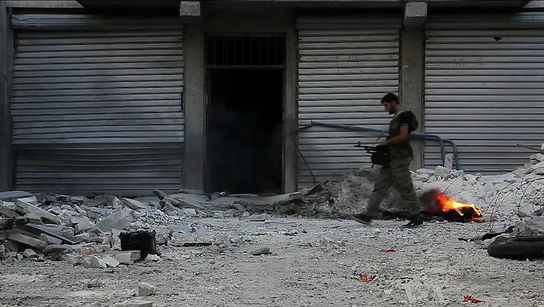|
CD Volume 8, Issue 7 We are currently facing what has been described as the worst humanitarian disaster since the Second World War. Regardless of whether it deserves this ignominious crown, the broader conflict spanning much of the Middle-East has seen millions displaced, perhaps 400,000 killed, and the region destabilised. Recent pictures of drowned refugees have mobilised a response to ameliorate some effects of the humanitarian crisis—yet as tragic as this is, it overshadows the broader issues the international community is failing to grapple with. The risk faced is that in the absence of the international leadership necessary to address these underlying issues this crisis will transition to a norm. The nature of the war and responses from the international community It is inaccurate to portray this as simply a Syrian conflict; it is a regionalised conflict with several theatres. Syria and western Iraq represent the largest and most violent of these. Few analysts today are willing to suggest the next five years will see the conflict abate. Two primary reasons drive this assessment. First is the nature of the conflict. Catalysts provided by the Arab Spring and preceding Iraq War are well known, but sectarian tensions and the region’s complex twentieth-century history have all contributed to what is now the apocalyptic fulcrum of the Sunni-Shia schism. Furthermore, this theological dimension is overlaid with pressures from ethnic nationalism, regional ambitions, and the broader strategic interests of the world’s powers. The second, and more disturbing, reason for pessimistic assessments is the parlous state of the international response. The Gulf States and Iran have embarked on a strategic war through proxies in Syria, Iraq, Lebanon and Yemen with little regard for its consequences. Turkey’s dislike for Assad is exceeded only by its hatred of the Kurds, and its inaction towards Sunni terrorist organisations. Russia, meanwhile, steadfastly supports their ally Assad, and blocks the UN Security Council in the wake of Libya and Ukraine. The West’s response has been varied. Western political leaders are almost universal in their condemnation of the actions of the Assad regime, Daesh, al-Qaeda-aligned Sunni Islamist groups, and Hezbollah. Yet with some notable exceptions, their actions do not always reflect the same commitment, particularly in the case of the US.
Australia is the second-largest contributor to a predominantly air-based military campaign against Daesh, but although an air campaign alone may contain or shape the group, it is unlikely to end its reign of terror. Military action against the other actors exacerbating the humanitarian crisis appears unlikely in the short-medium term for complex reasons, and as a result the conflict and its human toll grinds on. Human rights abuses Early in the conflict the UN Human Rights Council established the Independent International Commission of Inquiry on the Syrian Arab Republic to investigate allegations of human right abuses. Four years later we have witnessed genocide, the use of chemical weapons, medieval torture and executions, slavery, and ethnic cleansing with no reprieve in sight. The commission recommended referral of the conflict to the ICC. However, in May 2014 China and Russia vetoed the draft Security Council resolution. Subsequently there has been no referral by a State party, and discussions on an ad hoc tribunal similar to the International Criminal Tribunal for the former Yugoslavia remain stalled. This failure must not be understated. That in the future we may see convictions for breaches of international humanitarian law might be comforting or justice for some, but it is a damning indictment of the international community that neither a formal mechanism for investigation and prosecutions, nor a coordinated preventative response are in place for these crimes. That belligerents can act with impunity towards the most grave human rights breaches is one of the fundamental causes of the humanitarian crisis we face, and the response to date has been inadequate. The failure of international leadership Western reticence to engage in another Middle-Eastern war is understandable. Syria should not be a Western responsibility, nor should military action be the default response. However, the willingness of regional States and terrorist organisations to either support or participate in wholesale breaches of international humanitarian law demands intervention across the full political, legal, and if necessary, military spectrum. This is particularly the case with Daesh as they reject any compromise and the basic standards of humanity. Existing mechanisms in international law may deal with such complex situations, even when States use their veto power to paralyse bodies such as the UN. What is needed to enable a response is courageous and effective international leadership to decisively act against those carrying out or facilitating crimes such genocide. Unfortunately, that for nearly five years we have had more words than deeds from the world’s most powerful leaders is a profound moral failure that will reverberate for decades. Until we see such leadership emerge we will remain treating the symptom rather than the all too apparent cause. CD is a second-year JD student. Comments are closed.
|
Archives
October 2022
|



